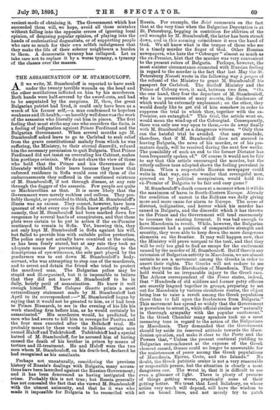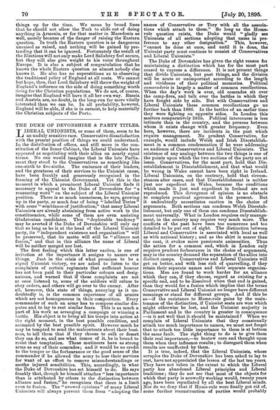THE ASSASSINATION OF AL STAMBOULOFF.
AS we write, M. Stambouloff is reported to have sunk under the twenty terrible wounds on the head and the other mutilations inflicted on him by his murderers. Both hands were half-severed by the sword-cuts, and had to be amputated by the surgeons. If, then, the great Bulgarian patriot had lived, it could only have been as a wreck of his former self,—a man condemned to hopeless weakness and ill-health,—so horribly well done was the work of the assassins who literally cut him in pieces. The first feeling that must strike any one who considers the facts, is a feeling of indignation against Prince Ferdinand and the Bulgarian Government. When several months ago M. Stambouloff asked leave to go to Carlsbad to seek relief from the grave constitutional malady from which he was suffering, the Ministry, to their eternal discredit, refused him the necessary permission to quit Bulgaria. That Prince Ferdinand did not insist on overruling his Cabinet, makes him particeps en minis. We do not share the view of those who hold that the Prince and his Government de- liberately withheld their leave because they knew that enforced residence in Sofia would soon rid them of the embarrassments they suffered in the continued existence of M. Stambouloff, if not through disease, at any rate through the dagger of the assassin. Few people are quite so Machiavellian as that. It is more likely that the Government were merely reckless and callous. They pro- bably thought, or pretended to think, that AL Stambouloff's illness was an excuse. They cannot, however, have been ignorant of what every one in Sofia knew perfectly well,— namely, that M. Stambouloff had been marked down for vengeance by several bands of conspirators, and that these plots were certain to be put in action if the ex-Premier continued to remain in Sofia. Yet, knowing this, they not only kept H. Stambouloff in Sofia against his will, but failed to provide him with suitable police protection. The police may not actually have connived at the crime, as has been freely stated, but at any rate they took no adequate means for preventing it. According to the descriptions of eye-witnesses, the sole part played by the gendarmes was to cut down H. Stambouloff's body- servant, who was attempting to stop one of the murderers, and to arrest and detain the friend who tried to protect the murdered man. The Bulgarian police may be stupid and ill-organised, but it is impossible to believe that they did not know AL Stambouloff to be in daily, hourly peril of assassination. He knew it well enough himself. The Cologne Gazette prints a most extraordinary statement made by AL Stambouloff last April to its correspondent :—" H. Stambouloff began by saying that it would not be granted to him, as it had been to Prince Bismarck, to see in the evening of his life his work standing firm before him, as he would certainly be assassinated.' His murderers would, he predicted, be men who had sworn to kill him in revenge for Pa.nitza and the four men executed after the Beltcheff trial. He probably meant by these words to indicate certain men named Haloff and. Tufektchieff. Tufektchieff had a special hatred of H. Stambouloff, for he accused him of having caused the death of his brother in prison by means of torture and ill-treatment. He and Haloff were the two men whom M. Stambouloff, on his death-bed, declared he had recognised as his assailants.
Perhaps not unnaturally, considering the previous history of Russia's dealings with Bulgaria, many accusa- tions have been launched against the Russian Government; and it has been denounced as having instigated the crime. Probably this is not true; but Russia generally has not concealed the fact that she viewed M. Stambouloff with the utmost animosity, and that he it was who made it impossible for Bulgaria to be reconciled with Russia. For example, the Sviet comments on the fact that at the very time when the Bulgarian Deputation is at St. Petersburg, begging in contrition for oblivion of the evil wrought by H. Stambouloff, the latter has been struck down, and in this seeming coincidence it sees the hand of God. We all know what is the temper of those who see in a timely murder the finger of God. Other Russian newspapers, who hate the " Coburger " almost as much as the ex-Premier, hint that the murder was very convenient to the present rulers of Bulgaria. Perhaps, however, the most sinister circumstance connected with Russian feeling in regard to the murder is the fact that last May the St. Petersburg Novosti wrote in the following way a propos of the refusal of the Ministry to grant AL Stambouloff his passport for Carlsbad. The Stoiloff Ministry and the Prince of Coburg were, it said, between two fires. "On the one hand, they fear the departure of H. Stambouloff, who is in possession of many secrets, the disclosure of which would be extremely unpleasant ; on the other, they would dearly like to get rid of him somehow in order to suppress the trial in which they, together with the ex- Premier, are entangled." This trial, the article went on, would mean the wind-up of the Coburgiad. Consequently, there was only one way open to them,—to do away finally with M. Stambouloff as a dangerous witness. "Only thus can the hateful trial be avoided. One may conclude, therefore, that if H. Stambouloff does not succeed in leaving Bulgaria, the news of his murder, or of his pre- mature death, will be received during the next few weeks. The possibility of such an end to the former Dictator has been frequently spoken of." Of course it would not be fair to say that this article encouraged the murder, but the utterly callous tone adopted shows the feeling prevalent in. Russia. When a respectable Russian newspaper could write in that way, can we wonder that revengeful men, spurred on by political conspirators, would hold the ex-Premier of Bulgaria to be fair and easy game ?
H. Stambouloff's death comes at a moment when it will do the maximum of harm in South-Eastern Europe. Already the condition of unrest in the Balkans was daily giving more and more cause for alarm to Europe. The sense of distrust, indignation, and horror which his murder has caused in Bulgaria, and the discredit which it has thrown on the Prince and the Government will tend enormously to increase the existing ferment. It was bad enough to have Macedonia in revolt. While, however, the Bulgarian Government had a position of comparative strength and security, they were able to keep down the more dangerous elements on the frontier. It may well happen now, that the Ministry will prove unequal to the task, and that they will be only too glad to find an escape for the excitement caused by the murder of AL Stambouloff. Butif there is any extension of Bulgarian activity in Macedonia, we are almost certain to see a movement among the Greeks in order to assert their rights. The Greeks will not endure to see what they term the Slavification of Macedonia. That they hold would be an irreparable injury to the Greek race. The Athens correspondent of the Times states, indeed, that 'Hundreds of old soldiers and former petty officers are secretly leagued together in groups, preparing to set out for Macedonia by various circuitous routes, the object being less to raise a revolt among the Greek population there than to fall upon the freebooters from Bulgaria." This movement has spread so widely that the Government is powerless to arrest it, while official circles are "naturally in thorough sympathy with the popular excitement." In the Greek Chamber many speakers took up a most menacing tone in regard to the action of the Bulgarians in Macedonia. They demanded that the Government should lay aside its reserved attitude towards the Mace- donian question, and make it clear to the Porte and the Powers that, "Unless the present continual yielding to Bulgarian encroachment at the expense of the Greek element ceased, Greece could no longer be answerable for the maintenance of peace among the Greek populations of Macedonia, Epirus, Crete, and the Islands." No doubt, the Greek patriotic orator is not a very reasonable or responsible person, but the situation is clearly a most dangerous one. The worst is, that it is difficult to see even a glimmer of light. There is plenty of promise of things getting worse, practically none of their getting better. We trust that Lord Salisbury, on whose action very much will depend, will have the wisdom to act on broad lines, and not merely try to patch things up for the time. We mean by broad lines that he should not allow the Turk to slide out of doing anything in Armenia, or for that matter in Macedonia as well, merely because of the danger of raising the Eastern question. In truth the Eastern question is as dangerous unraised as raised, and nothing will be gained by pre- tending that it can be ignored. Fortunately the result of the Elections will not only make Lord Salisbury feel secure, but they will also give weight to his voice throughout Europe. It is also a subject of congratulation that he knows the whole Eastern question as almost nobody else knows it. He also has no superstitions as to observing the traditional policy of England at all costs. We cannot but hope, then, that Lord Salisbury will throw the weight of England's influence on the side of doing something worth doing for the Christian populations. We do not, of course, imagine that England will have it all her own way. Russia and Austria are, no doubt, in the long-run far more vitally ieterested than we can be. In all probability, however, England will be able, if she is in earnest, to help materially the Christian subjects of the Porte.



































 Previous page
Previous page